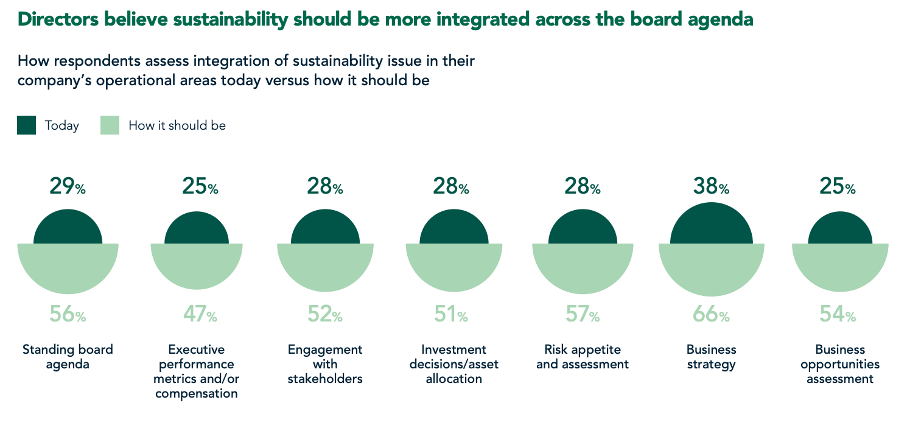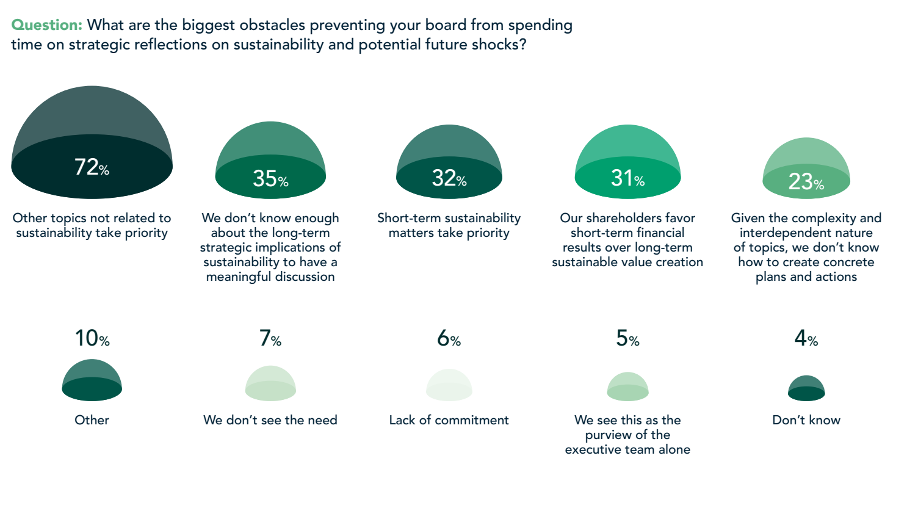Sustainable Development Struggles to Find Its Place in Corporate Strategy
The world is rapidly changing. Climate change, geopolitical tensions, and the development of artificial intelligence are just a few of the topics that will significantly impact the future of businesses. In the face of these transformations, one would expect intensive discussions about changing strategies and implementing sustainable development in the boardrooms of large corporations. Unfortunately, the reality is disappointing. According to an survey conducted by the Boston Consulting Group (BCG), Heidrick & Struggles and Insead, such deep strategic discussions rarely happen in corporate boardrooms worldwide.
Lack of Integration of Sustainable Development in Business Strategies
The survey, involving 879 directors and supervisors from firms in 45 countries across Europe, the United States, and Asia, revealed that many companies struggle with effectively integrating sustainable development into their strategies. Often, this issue gets overshadowed by more immediate concerns related to the present. Sustainable development policies are mainly discussed due to pressures from governments, shareholders, or activist movements. Only when businesses face significant risks associated with climate change, they start taking action. However, only 66% of the surveyed directors responded that “considerations of sustainable development should be fully integrated into their strategy,” and only 38% stated that it was already the case.

Obstacles to Integrating Sustainable Development
Half of the surveyed directors believe sustainable development should be fully considered in the investment decision-making process, but only 30% stated it is currently happening. This is partially due to companies being preoccupied with upcoming regulations and reporting requirements on sustainable development that they must comply with by 2024. As a result, managers have little time for strategic discussions and focus on more urgent priorities. Moreover, the financial risks associated with climate change have minimal impact on financial results, and shareholders mainly concentrate on economic aspects.
The reason why managers claim they don’t have time for strategic discussions is quite simple. According to them, after the COVID-19 pandemic and the invasion of Ukraine by Russia, they have other pressing matters to attend to. 72 percent of respondents state that these urgent priorities prevent them from dedicating time to thinking and having conversations about sustainable development strategies.
Moreover, the financial risks associated with climate change have minimal impact on financial results, which is precisely what company stakeholders focus on. 68 percent of surveyed respondents do not see or see only a slight impact on revenues and profits. Even in the long run, only one-fourth of managers perceive financial risks associated with not integrating sustainable development into the company’s operations. Only 10 percent expect negative consequences in the medium to long term.

Source: The Role of the Board in the Sustainability Era, Heidrick and Struggles
The Need for a Change in Thinking
The study showed that managers and supervisors often lack awareness of sustainable development possibilities for companies. They mostly focus on current issues and rarely consider long-term income models. This requires courage and a broader perspective on the future, qualities few managers possess.
- Influence of Governments, Shareholders, and Activists
Pressure from governments, shareholders, and activist movements plays a significant role in driving actions related to sustainable development. Companies often respond to these pressures to avoid reputational risks or legal consequences. However, such an approach is defensive and prevents them from fully embracing sustainable development opportunities. Breaking away from this pattern and gaining more knowledge about the benefits of investing in sustainable development is crucial.
- Education for Managers and Supervisors
To achieve better integration of sustainable development in business strategies, increasing awareness among managers and supervisors about the benefits of investing in sustainable development is essential. Education in this area can help change their mindset and approach. Companies should also invest in developing internal resources in the field of sustainable development to integrate these issues into their strategies effectively.
- Success Stories from Companies
Although integrating sustainable development into business strategies may be challenging, there are many examples of companies that have succeeded in this area. Companies like Patagonia or Tesla consistently invest in sustainable development and achieve success both financially and reputation-wise. This proves that sustainable development can be a source of competitive advantage. However, many more examples can be cited because consumers increasingly support companies that promote sustainability in their products and services. It is becoming more and more of a requirement for making purchases or conducting transactions.
For decades, attention has been drawn to the need of preserving nature for future generations. Yet, businesses still engage in business models without sustainability in their minds. The fact that managers in this study acknowledge the need for change should be seen as progress. However, there are still many factors that hold them back from taking bold steps.
At Ecobal we assist both consumers and businesses in comprehending their carbon footprint and preserving the natural environment. Our concrete and certified solutions empower them to make positive changes to their lifestyle or business operations, ensuring a better environmental protection.
Are you interested in promoting sustainability? Take a step towards greener future and contact us at: https://ecobal.eu/contact
Sources:
https://www.bcg.com/press/10july2023-knowledge-gaps-sustainability


